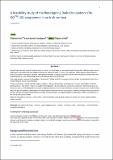| dc.contributor.author | Fox, Jackie | |
| dc.contributor.author | Erlandsson, Lena-Karin | |
| dc.contributor.author | Shiel, Agnes | |
| dc.date.accessioned | 2021-02-09T15:23:40Z | |
| dc.date.issued | 2021-02-08 | |
| dc.identifier.citation | Fox, Jackie, Erlandsson, Lena-Karin, & Shiel, Agnes. (2021). A feasibility study of the Redesigning Daily Occupations (ReDOTM-10) programme in an Irish context. Scandinavian Journal of Occupational Therapy, doi:10.1080/11038128.2021.1882561 | en_IE |
| dc.identifier.issn | 1651-2014 | |
| dc.identifier.uri | http://hdl.handle.net/10379/16544 | |
| dc.description.abstract | Despite high demand, mental health services in primary care in Ireland are underdeveloped. People with mild/moderate anxiety, depression and unspecified psychological distress are frequently seen in primary care settings, mostly by general practitioners (GPs). Occupational therapists have the potential to contribute to service-provision with interventions specially designed for the targeted group e.g. the Redesigning Daily Occupations programme (ReDO-10).
This study aimed to explore the feasibility of a future RCT of the ReDO-10 programme in Ireland and the contextual factors that would influence future implementation.
Using a multi-phase, mixed-method design, qualitative and quantitative data were gathered from key stakeholders: ReDO-10 participants (n¿=¿10), GPs (n¿=¿9) and occupational therapists (n¿=¿2). Acceptability, satisfaction, cultural fit and demand were explored, as well as methodological issues such as appropriateness of recruitment methods, outcome measures and randomization.
ReDO-10 was acceptable to participants who reported improvements in their occupational patterns and valued the group-based format. GPs and occupational therapists welcomed the intervention, but acknowledged the limitations of time and resources in the Irish primary care context.
ReDO-10 is feasible to explore in a future RCT in Ireland and this study provides important context for future implementation and/or research. | en_IE |
| dc.description.sponsorship | This study was supported by the Further Education Fund and the Millennium Research Fund at the National University of Ireland, Galway. Lund University, Sweden, provided funding for the ReDO training to be delivered to occupational therapists in Ireland for the purposes of this study. | en_IE |
| dc.format | application/pdf | en_IE |
| dc.language.iso | en | en_IE |
| dc.publisher | Taylor & Francis | en_IE |
| dc.relation.ispartof | Scandinavian journal of occupational therapy | en |
| dc.rights | Attribution-NonCommercial-NoDerivs 3.0 Ireland | |
| dc.rights.uri | https://creativecommons.org/licenses/by-nc-nd/3.0/ie/ | |
| dc.subject | Occupational therap | en_IE |
| dc.subject | women | en_IE |
| dc.subject | psychological stress | en_IE |
| dc.subject | anxiety | en_IE |
| dc.subject | feasibility study | en_IE |
| dc.subject | pilot study | en_IE |
| dc.subject | mixed methods | en_IE |
| dc.subject | occupational balance | en_IE |
| dc.subject | Occupational therapy | en_IE |
| dc.title | A feasibility study of the Redesigning Daily Occupations (ReDOTM-10) programme in an Irish context | en_IE |
| dc.type | Article | en_IE |
| dc.date.updated | 2021-02-09T13:33:05Z | |
| dc.identifier.doi | 10.1080/11038128.2021.1882561 | |
| dc.local.publishedsource | https://dx.doi.org/10.1080/11038128.2021.1882561 | en_IE |
| dc.description.peer-reviewed | peer-reviewed | |
| dc.contributor.funder | Millennium Fund, National University of Ireland Galway | en_IE |
| dc.contributor.funder | Lund University, Sweden | en_IE |
| dc.description.embargo | 2022-02-08 | |
| dc.internal.rssid | 24732508 | |
| dc.local.contact | Jackie Fox, Occupational Therapy, Nui Galway. Email: jackie.fox@nuigalway.ie | |
| dc.local.copyrightchecked | Yes | |
| dc.local.version | ACCEPTED | |
| nui.item.downloads | 175 | |


